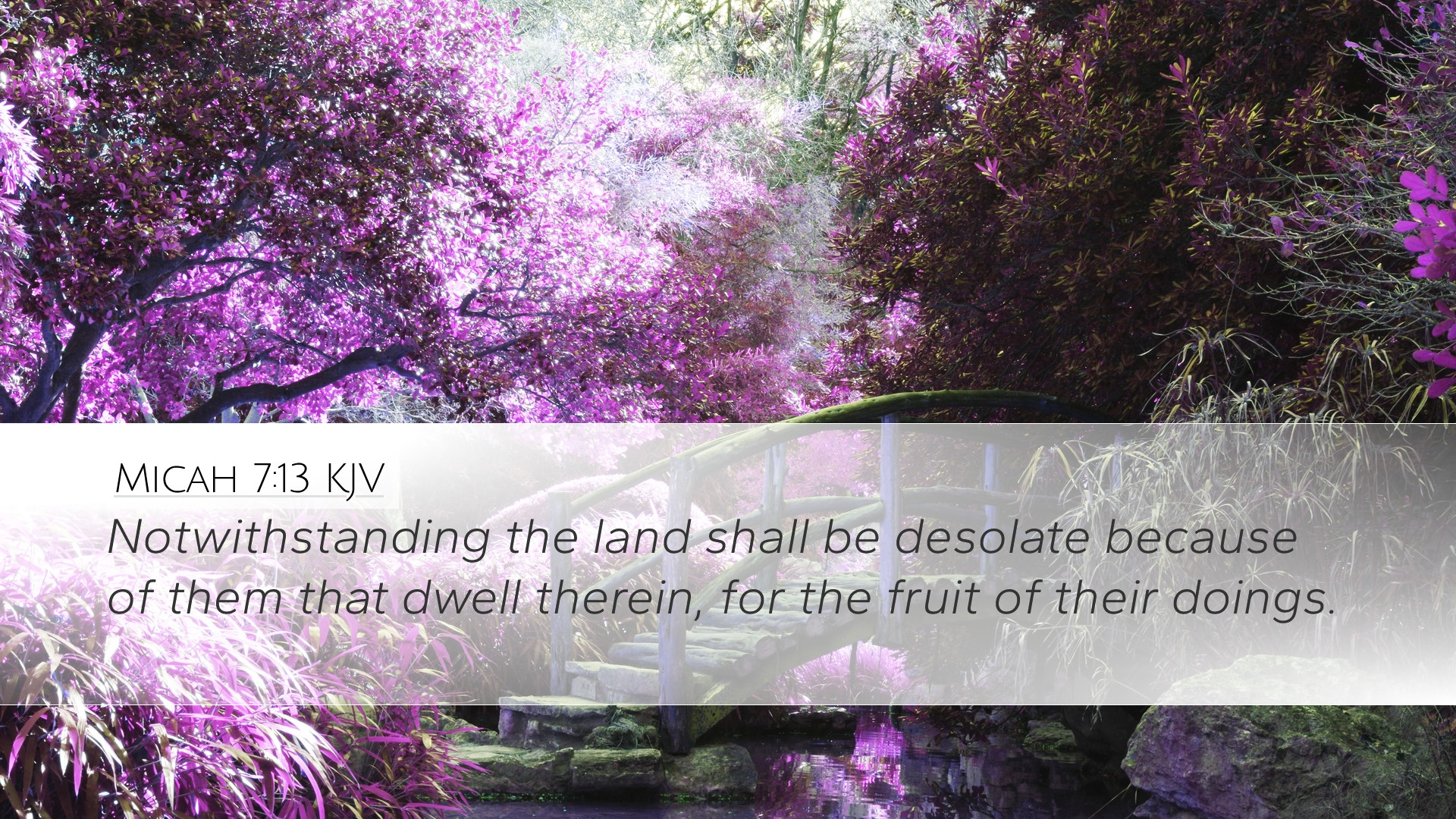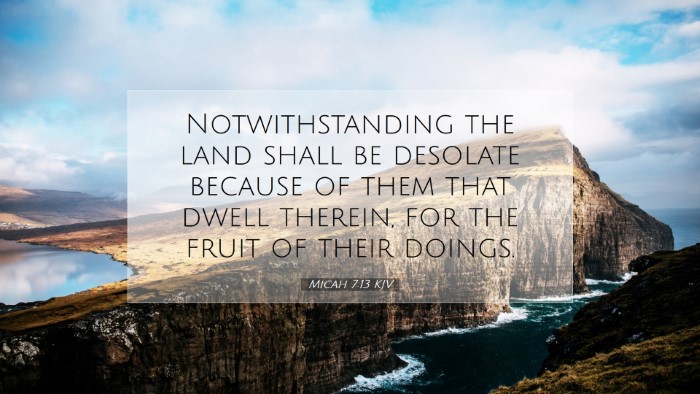Old Testament
Genesis Exodus Leviticus Numbers Deuteronomy Joshua Judges Ruth 1 Samuel 2 Samuel 1 Kings 2 Kings 1 Chronicles 2 Chronicles Ezra Nehemiah Esther Job Psalms Proverbs Ecclesiastes Song of Solomon Isaiah Jeremiah Lamentations Ezekiel Daniel Hosea Joel Amos Obadiah Jonah Micah Nahum Habakkuk Zephaniah Haggai Zechariah MalachiMicah 7:13
Micah 7:13 KJV
Notwithstanding the land shall be desolate because of them that dwell therein, for the fruit of their doings.
Micah 7:13 Bible Commentary
Commentary on Micah 7:13
Micah 7:13 states, "Notwithstanding the land shall be desolate because of them that dwell therein, for the fruit of their doings." This verse culminates the prophet Micah's lamentation over Israel's moral decay and impending judgment, while also hinting at the ultimate hope for restoration. Through this commentary, we will explore insights from public domain commentaries by Matthew Henry, Albert Barnes, and Adam Clarke, weaving together their thoughts for a deeper understanding.
Contextual Overview
Micah, a contemporary of the prophets Isaiah and Hosea, prophesied during a tumultuous period in Israel's history. The nation faced corruption, injustice, and spiritual decline, particularly in its leadership. His message calls out the sins of the people and warns of the consequences that will arise from their actions. As we examine Micah 7:13, it is essential to consider the themes of judgment, desolation, and ultimately, restoration.
Exegesis of Micah 7:13
This verse presents a stark summary of the consequences that Israel faces due to its disobedience. The language used is indicative of divine judgment, which will lead to desolation. Below are some key insights drawn from the aforementioned commentaries:
The Nature of Judgment
Matthew Henry emphasizes that the desolation of the land serves as a direct result of the people's sins. He states, “The ground shall be desolate; it will yield no fruit, for it is cursed.” This notion illustrates the biblical principle of sowing and reaping, where the moral and spiritual corruption of a nation leads to tangible consequences in their fertile land. Such a desolation signals not just physical barrenness but also spiritual abandonment.
Spiritual Insight
Albert Barnes provides a penetrating insight by connecting the spiritual state of the people directly to their environment. He argues that the land reflects the moral condition of its inhabitants. “If men are corrupt and wicked, the earth suffers, and its fruitfulness is marred,” Barnes asserts. Therefore, the desolation is not merely an act of God but a consequence of the people's moral failures and the resultant alienation from Him.
Theological Implications
Adam Clarke delves into the theological implications of Micah's message. He notes that the phrase "the fruit of their doings" encapsulates the inevitable outcome of Israel's choices. Clarke highlights that the verse serves as a reminder that while God is merciful and gracious, His justice prevails. Every action breeds its consequences; thus, the desolation of the land points to the seriousness of sin and God's righteous judgment.
Lessons for Today
The message of Micah 7:13 is timeless, offering insights that resonate profoundly with contemporary audiences. Here are some key lessons derived from the combined commentaries:
- Awareness of Consequences: Just as the Israelites faced the repercussions of their unfaithfulness, so too must modern believers be aware that their actions will lead to certain outcomes, both in spiritual and physical realms.
- Call to Righteousness: The passage serves as a call for self-examination and a return to righteous living. It urges individuals and communities to reflect on their moral climate and its implications.
- Hope in Restoration: While the verse highlights desolation, it also lays the foundation for hope in God's mercy and eventual restoration. Micah's overall message is one of caution but also of promise, reminding us that while judgment may come, forgiveness and healing are within reach for those who turn back to God.
- Impact of Leadership: The emphasis on the people's sins points to the crucial role of leadership in guiding a nation or community. Leaders must embody integrity and righteousness to foster a right relationship with God among their followers.
Conclusion
In conclusion, Micah 7:13 serves as a profound reminder of the spiritual truths that govern the relationship between a people and their God. Insights from Matthew Henry, Albert Barnes, and Adam Clarke illuminate the weighty implications of sin, the certainty of divine judgment, and the prospect of restoration. For pastors, students, theologians, and Bible scholars, this verse encapsulates the urgent need for moral integrity, the acknowledgment of God’s sovereign justice, and the hope that, even in desolation, a path to redemption is available.


